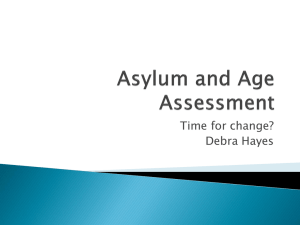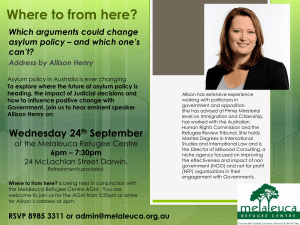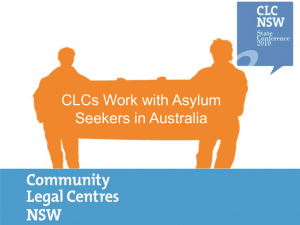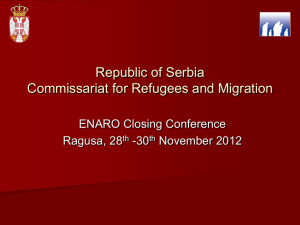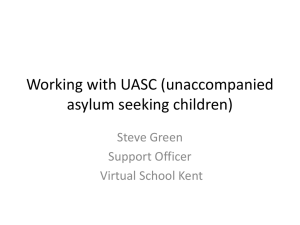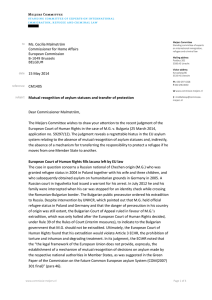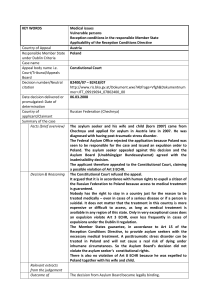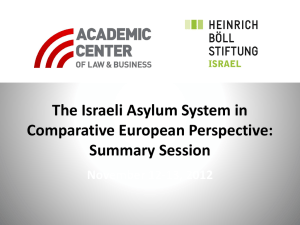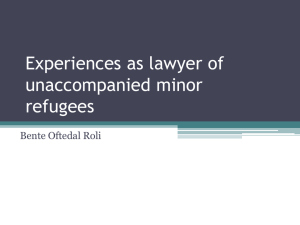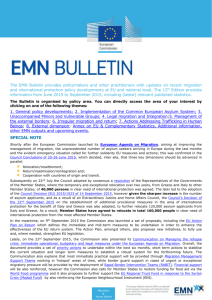3. Anna Gupta and Sue Clayton
advertisement
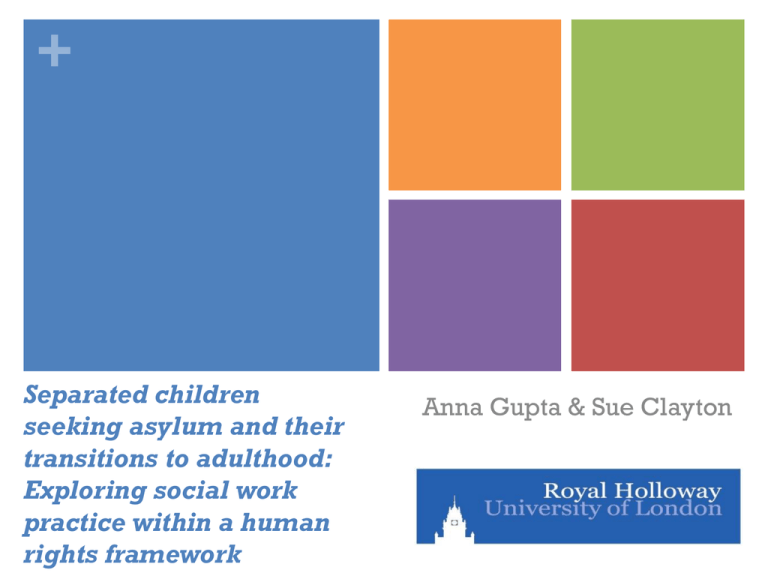
+ Separated children seeking asylum and their transitions to adulthood: Exploring social work practice within a human rights framework Anna Gupta & Sue Clayton + UNACCOMPANIED AND SEPARATED CHILDREN SEEKING ASYLUM (UASC) Context setting In 2012 1,168 unaccompanied children sought asylum in the UK - down 16% from 2011 (down from 4285 in 2008 and 3174 in 2009) The largest country of origin is Afghanistan (22%) 67% came from 5 countries (Afghanistan, Albania, Iran, Vietnam and Eritrea) 82% male (www.refugeecoucil.org.uk) + Some key elements of asylum process Age assessment -if under 18 according to Merton decision must be provided with accommodation; however services vary according to age decision and local authority. If refugee status not granted, UASC seeking asylum are granted a period of Discretionary Leave until they turn 17 and a half years of age Children under 18 are covered by UNCRC and state parties need to find 'durable solutions' but this rarely happens Since beginning of 2010 much harder for UASC seeking asylum to get extensions. In 2012 the refusal for those turning 18 was 78%. Once appeal rights are exhausted (ARE) - young people are liable for removal - forced removal or by voluntary means. Many young people also go underground once they become ARE, and have to live as an undocumented migrant. Some remain ‘in limbo’ as they have exhausted all appeal rights, but have not been removed because, for example, the Home office is not able to obtain travel documents (also referred to as ‘end of line’) + UASC's experiences as they turn 18 Enduring uncertainties about the future Fear of consequences of forced return Loss of friendships, foster families and other carers and support networks Loss of education Loss of dreams and hopes for the future Unsurprisingly 80% of referrals to the Tavistock child and family refugee team for UASC are for 17 year olds + Approaching 18 … Context creates negative definitions of identity: Right Not to be in UK being questioned being believed in court Re-telling traumatic stories, ‘victim’ identity Public discourses ‘bogus asylum seekers’ ‘dole scroungers’ Can be internalised by young people and influence how they are ‘constructed’ by professionals + What about young people who are returned? Diverse responses of families to returning young people – some no families Shame of returning empty-handed Young people viewed as outsiders Psychosocial impact of insecurity –lack of mental health services Contrast of acute poverty with life in the UK Forcible recruitment – Southern provinces Kidnapping, violence intimidation and threats Perceptions – alignment with Western forces or of wealth Limited opportunities for employment/education Wanting and trying to return ( Broken Futures - www.refugeesupportnetwork.org.uk) + One young man’s story…. + Some challenges for social workers Internalisation of discourse on immigration and asylum – constructing the ‘deserving’ and ‘undeserving’ UASC seeking asylum. – ‘they lose interest in you as soon as you turn 18’ Discriminatory and unlawful organisational policies (e.g. different responses to care leavers) Awareness of ECHR Article 6 (fair trial rights) not being upheld in court process – young person’s fears not being heard Relationship with UKBA, e.g. engaging with the policy of assisted voluntary return when young person does not want this? role/responsibilities if the young person if young person ‘goes underground’? + Use of the Law to Promote Human Rights (1) Ensuring entitlement to leaving care services: All ‘former relevant children’ entitled to leaving care services If only s17, maybe able to challenge non-entitlement if they should have been accommodated (according to Merton decision) If ARE (or ‘failed asylum seekers’) can still receive support until fail to comply with removal directions or if it would breach ECHR rights (e.g. Article 3 – inhuman or degrading treatment (destitution)) + Use of the Law to Promote Human Rights (2) Alongside asylum legislation, separated young people seeking asylum can also apply for leave to remain in the UK on ECHR Article 8 (right to respect for private and family life) grounds. Social workers can: Ensure good legal representation and question whether HR rights are being addressed Work with young people, carers and others in network to demonstrate relationships and links with UK community (e.g. portfolio of life in UK, testimonies …) + Some suggestions for good practice Develop supportive relationships with young people – get to know the individual and their story – critically reflect on personal values and assumptions Challenge discriminatory and unlawful practices in organisations – engage in debate about relationship with UKBA and SW values Develop own and young people’s links with voluntary/NGO refugee/ anti-deportation organisations – ensure information is provided to make informed decisions, sound legal advice is obtained, and contact maintained if in detention or forcibly returned Ensure human rights legislation is considered and used when appropriate + References Bolton, S., Kaur, K., Luh, S.S., Pierce, J. & Yeo, C. (2011) Working with refugee children: Current issues in best practice. London:ILPA Chase, E. (2010) ‘Agency and Silence: Young people seeking asylum alone in the UK’. British Journal of Social Work, 40: 2050-2068Children’s Society (2012a) Into the Unknown: Children’s journeys through the asylum process. http://www.childrenssociety.org.uk/sites/default/files/tcs/into-the-unknown--childrens-journeys-through-theasylum-process--the-childrens-society.pdf Derluyn, I, and Broekaert. E. (2008) ‘Unaccompanied refugee children and adolescents: The glaring contrast between a legal and a psychological perspective.’International Journal of Law and Psychiatry 31.4 (2008): 319-330. Gladwell, C. & Elwyn, E. (2012) Broken Futures: Young Afghan asylum seekers in the UK and in their country of origin. Geneva:UNHCR Wright, F. (2013). Social Work Practice with Unaccompanied Asylum-Seeking Young People Facing Removal. British Journal of Social Work. (Advance on-line access) Also: www.childrenslegalcentre.com www.refugeesupportnetwork.org www.youngpeopleseekingsafety.co.uk www.refugeecouncil.org.uk

